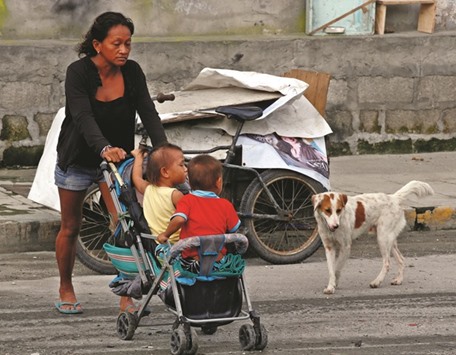The Philippine economy expanded 7.0% in the second quarter, official data showed yesterday, but President Rodrigo Duterte’s new government said major changes were needed to fix one of Asia’s biggest rich-poor divides.
The April-to-June period covered the final months of Benigno Aquino’s administration, capping six years of stellar growth that helped boost the Philippines’ credit ratings and end its reputation as one of the region’s economic laggards.
However, Duterte won a landslide election victory partly on his railings against the nation’s elite who have soaked up much of the benefits of the growth, while leaving a quarter of the nation’s 100 million people living below the poverty line.
Duterte’s economic chiefs yesterday credited the 7.0-% growth on annualised basis in the second quarter, the fastest in three years, to Aquino’s “sound marco-economic, fiscal and monetary policies”, but emphasised the poor were continuing to be left behind.
“We need to sustain that rebalancing toward investment-driven growth, especially investment that will lead to more inclusive, poverty-reducing, inequality-reducing growth,” Economic Planning Secretary Ernesto Pernia said.
Pernia said the Duterte administration was particularly concerned about the farming and fisheries sector, which accounts for about 10mn workers and their families.
“Knowing that the majority of poor Filipinos rely on this sector for their livelihood, this administration will prioritise agricultural development,” he said.
The sector declined 2.1% from April-June, the fifth consecutive quarter of declines.
Nevertheless, Finance Secretary Carlos Dominguez also said Aquino’s administration had helped set the foundations for even stronger overall growth, setting a target of at least 7% for the second half of this year and 6.5-7.5% in 2017.
“Our strong macro-economic fundamentals will buffer the Philippine economy from external shocks,” Dominguez said.
The government is aiming to cut the poverty rate from 26% currently to 17% when Duterte steps down in 2022.
Dominguez said this would begin with a stimulus programme focused on infrastructure, education and health. The government on Tuesday unveiled its 2017 budget, announcing an overall increase of 11.6% in spending.
Education was one of the biggest winners, with a 31% rise.
Dominguez also said the government would expand a government programme providing free contraceptives to poor couples and allowing sex education to be taught in schools.
A landmark law enabling this passed under Aquino but budget cuts by lawmakers in the mainly Catholic nation diluted its effectiveness.
Duterte has said helping Filipinos have fewer children is one of the keys to poverty reduction.

A woman pushes her children on a stroller after around a dozen homeless people were evicted along a road in Makati, Metro Manila, yesterday.
